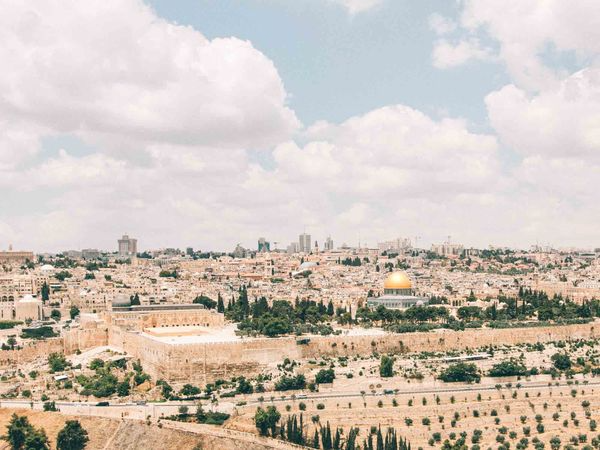Israeli musician, writer, and former student of Anthroposophic Studies at the Goetheanum, Omer Eilam, reflects on the attacks by Hamas and the response by the Israeli government, and calls for a radical and courageous change of course.
On Saturday, October 7th, Hamas made an unprecedented attack on Israel, infiltrating through the Gaza border, slaughtering hundreds of people, kidnapping families, and committing other violent deeds which are incomprehensible to any sane person. In response, the Israeli military has been heavily bombarding Gaza in an operation that so far has claimed the lives of more than 3,000 people, injured tens of thousands and displaced many more from their homes. My heart goes out to all those whose lives were shattered by these events, Israelis and Palestinians alike.
Some voices claim that Hamas’ offense can be seen as “Israel’s 9/11”, a terror attack beyond anything that anyone could have imagined, which found the Israeli defense forces completely unprepared and left a trauma in its wake. What if we followed this line of thinking further and tried to learn from history in order not to make the same mistakes? The events of 9/11 prompted the United States government to declare the “War on Terror,” which led to the invasion of Afghanistan, the war in Iraq, and the formation of ISIS, to name just some of the consequences. All of these claimed the lives of millions, led to the displacement of tens of millions, and caused immeasurable suffering.
When someone punches us, our immediate reaction is to want to punch back. It takes a moment of inner calmness to allow for reflection: What will happen if I punch back? Is continuing the cycle of violence what I really want? Or does my innermost soul yearn for peace?
Both Hamas and the Israeli government have failed their people terribly. Have we had enough? Are we ready to change course? If we are, then let us be part of a mounting international call for both ruling parties to step down and make way for others who are willing to work in the service of peace. Let us demand an immediate cease-fire and the beginning of a diplomatic process for the swift release of all hostages. My mind says I am naive, and yet my heart knows it has had enough of mind games. Knowing full well that it will not happen tomorrow and that there will still be many casualties along the way, let us build an inner courage and determination that peace is our vision for the long-term and that every day, we are doing a little something to draw closer to this vision.
More about the author, including more writings on Israel and Palestine: Omer Eilam
Image View of the Old City of Jerusalem, home to the several sites of key importance and holiness to Judaism, Islam and Christianity. Photo: Robert Bye/unsplash










Interesting comments, and yes, naive and so generalised as to be meaningless. In other words, no-one could possibly be upset by your plea for peace and humanity from both sides. Rudolf Steiner has many things to say about how both these tribes, now called Israel and Palestine, have played their part in world history and religious beliefs, and how tribal/nationalism is a backward step in our evolution as individuals and world citizens. Rudolf Steiner also tells us about evil today and how ‘peace’ ‘unity’ and all the other well-meaning platitudes can be better understood if one can achieve inner peace and serenity. Courage is certainly needed to face the world today.
It’s strange that such a short text on such a huge subject appears in our weekly journal for anthroposophy. Of course, one must respect the feelings of the author, which reflect his suffering heart and a troubled mind in the face of extreme violence and misery in the world. Nevertheless, the mere call for peace and more peace is not the key to a troubled historical epoch, which has the task of correctly confronting Evil as a step forward in evolution. The text does not even touch the combined and complex earthly and spiritual foundations of the phenomena surrounding the state of affairs called “war”. It deplores the absence of peace and refers to the horrors of death bodies like any daily bulletin. But Rudolf Steiner provided many readable explanations of “war” – from the simple condition of two people involved in a disagreement, to wars that engulf the whole world. Steiner’s courageous explanations are often surprising. The deep state of collective antipathy that begins with a military confrontation is strongly stimulated by the astral atmosphere of the daily slaughter of millions of animals for human consumption. This is a powerful supernatural impulse for an irrational wilderness in the minds of all combatants involved – they become more and more insentient human-animals, entering that level of hysterical and pathological escalation called “fighting for victory, and anihilation of the enemy”. Later, like in a burn-out symptom, “peace” follows “war”, just as daylight follows the darkness of the night. But such a peace is not a permanent healthy state, it’s just the “absence of war”. The spiritual essence of war has not been dealt with. According to Steiner’s comments on the First World War, the respective “social carcinoma” remains untouched and will provoke another and another war in the future. In precise and passionate words about the need for a Threefold Social Order, he explained that we should first have the courage to expose the truth behind the curtains. For example: to reveal that all forms of community based on the principle of organic blood-brotherhood are wild relics of mankind’s primitive tribal past. They are dead and inoperative impulses for our Michaelic era.
The same is true for modern social communities based on a kind of blind faith inspired by the feeling of “nationalism” or “patriotism”. Here Steiner sharply condemned the efforts of the American President Woodrow Wilson after the First World War, to establish a new and peaceful world order (the famous “Fourteen Points” of his moral diplomacy) based on the inalienable right of people to choose their form of nation, government and leaders. To this day, this echoes in the wild and aggressive impulses of all obsessive nationalisms around the world and their tendency towards bloody military confrontations. Steiner even revealed an amazing karmic detail: Woodrow Wilson was the reincarnation of an ancient Islamic personality, and his famous political “Fourteen Points” reflect the fourteen pillars of Islamic prayer.
In the case of the current Palestinian conflict, we are really confronted with very deep religious roots that almost no one wants to discuss. First of all and foremost (in contrast to the shameful secularism and materialism that dominates the Western world) both Judaism and Islamism praise, practically as secret brothers, a common Almighty God and strictly follow permanent meditations in their common life (three daily prayers for Israelis, and five daily prayers for Muslims). Both cultures praise “peace” (salaam in Arabic, shalom in Hebrew) as the source of well-being, harmony, wholeness, completeness, prosperity, welfare and tranquility for the whole of mankind. But they do not reject to promote it through death and material weapons!
From Thomas Friedman in the New York Times: “with wise leadership, if the United States would now tell Netanyahu what we should have told him many years ago — not one nail, not one brick, not one ounce of cement is going to go into another settlement outside the settlement blocks that will basically prevent a two-state solution. So we’re going to have that argument right now because you have no way of getting out of Gaza, and we have no way of supporting you in the perfect war without some hope for a two-state solution.”